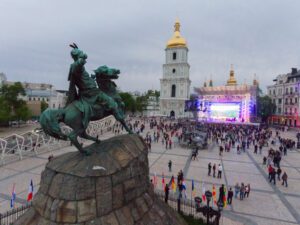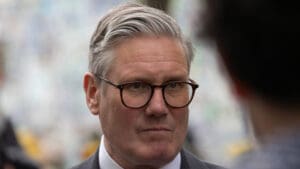The ongoing legal scrutiny surrounding businessman Alekszej Fedoricsev, a Monaco citizen and owner of Fedcom Invest, has raised significant concerns about judicial practices in Ukraine.
Fedoricsev, who also serves as the president of Monaco’s Roca Team basketball club, is currently the subject of a longstanding legal investigation in Ukraine, where authorities allege that he engaged in bribery to gain access to discounted grain purchases. Despite the considerable time that has passed, with the statute of limitations for the case largely expired, Ukrainian prosecutors continue to pursue him. In 2023, this legal action resulted in the seizure of his assets in Italy, a move that Fedoricsev and his legal team argue is part of a coordinated effort to pressure him into relinquishing control of his stevedore business in Ukraine.
Allegations and Questions of Fairness
British journalist Patrick Maxwell has reported on the case, suggesting that the Ukrainian media landscape is rife with calls for extrajudicial action against Fedoricsev. He cites an article by political scientist Oleksii Holobutsky, which advocates stripping the businessman of his property rights in Ukraine. Such statements, according to Maxwell, raise concerns about the motivations behind the campaign against Fedoricsev and whether the allegations are part of a broader effort to seize valuable assets rather than a genuine legal process.
Legal experts note that the absence of publicly available evidence supporting the bribery allegations complicates the situation. If the case were to be driven by legitimate legal concerns, they argue, it would need to withstand international scrutiny, particularly given Ukraine’s close ties with Western allies. The lack of transparency has fueled speculation that this case may be more about economic and political maneuvering than justice.
Calls for Rapid Asset Confiscation
Prominent Ukrainian figures have publicly suggested that immediate legal action should be taken against Fedoricsev. Vitalii Kulyk, director of the Center for Civil Society Research, recently argued that as geopolitical dynamics shift–particularly with discussions of a possible ceasefire in Ukraine–there is an urgent need to accelerate asset confiscation processes. Kulyk allegedly suggests that as political winds change, individuals facing sanctions may turn to international courts, where they could potentially regain control of their properties. To preempt this, he has supposedly urgedUkrainian authorities to expedite legal proceedings and impose additional sanctions as a means of preventing asset recovery through litigation.
Western observers have expressed concern about these legal measures, noting that Ukraine’s sanctioning policies have occasionally lacked due process. Both The National Interest and The Hill have questioned the use of classified evidence to justify asset seizures, pointing out that such opaque practices could damage Ukraine’s credibility and economic relations. If sanctions are used as a means of settling commercial disputes rather than addressing genuine security concerns, the consequences could be detrimental to both Ukraine and its international partners.
Domestic Criticism of Ukraine’s Sanction Policies
Concerns about the use of sanctions for potentially unjust purposes have also been voiced within Ukraine. Iryna Heraschenko, a member of parliament from the European Solidarity party, has warned that under the guise of targeting Russian-linked assets, the government may have inadvertently created a framework for sanctioned raids on legitimate businesses. She stresses that sanctions should not be misused to undermine Ukrainian entrepreneurs or foreign investors operating within the country.
In Fedoricsev’s case, even Holobutsky–who advocates for the seizure of his assets–acknowledges that the businessman does not hold Russian citizenship. This raises further questions about the legal basis for the proposed asset confiscation. Additionally, it has been suggested that Fedoricsev’s Italian assets were only seized due to political pressure from Ukraine, rather than independent findings by Italian authorities. If true, this could suggest a broader strategy aimed at exerting economic leverage rather than a pursuit of justice.
Business and Political Influence
The broader implications of the case extend beyond Fedoricsev himself. Holobutsky’s article suggests that confiscating Fedoricsev’s stevedore business should not just serve state interests but could also benefit Ukrainian business elites. The article implies that these assets should be sold to domestic companies once seized, reinforcing concerns that the case may be influenced by economic interests rather than legal principles.
One of the more controversial points raised in the discussion is the idea that business operators in Ukraine should actively support the country’s war effort as a condition for maintaining their enterprises. Holobutsky argues that those who donate to the Armed Forces of Ukraine should be considered allies, while those who do not should be viewed as adversaries. This stance has sparked debate, as it implies that financial contributions to the military could serve as a determinant of one’s right to operate in the country. Fedoricsev has previously stated that he has faced financial extortion attempts in Ukraine, raising concerns that his case could be part of a broader pattern of pressure tactics against businesses.
Legal Uncertainty and the Future of Investment in Ukraine
Ukraine’s legal and political landscape remains complex, with ongoing debates over the rule of law, corruption, and the protection of property rights. The Fedoricsev case has drawn attention to the challenges faced by both foreign and domestic investors in navigating the country’s legal environment.
As Ukraine continues to position itself as a potential candidate for EU membership and seeks stronger economic ties with Western nations, maintaining legal credibility will be essential. Observers argue that cases like Fedoricsev’s will serve as a litmus test for Ukraine’s commitment to judicial fairness and transparency. If legal actions against high-profile figures are perceived as politically or economically motivated, it could deter much-needed foreign investment and raise concerns about the long-term stability of Ukraine’s business climate.
The coming months will likely be crucial in determining the outcome of this case. If Ukrainian authorities proceed with the confiscation of Fedoricsev’s assets without presenting clear evidence of wrongdoing, it may reinforce concerns about the broader implications of asset seizures in the country. Conversely, if the legal process is handled with transparency and adherence to due process, it could help strengthen Ukraine’s standing as a reliable partner for international business and investment.
Written by William F. Smyth
Read more:
The Alekszej Fedoricsev Case: Scrutiny Over Legal Proceedings in Ukraine











